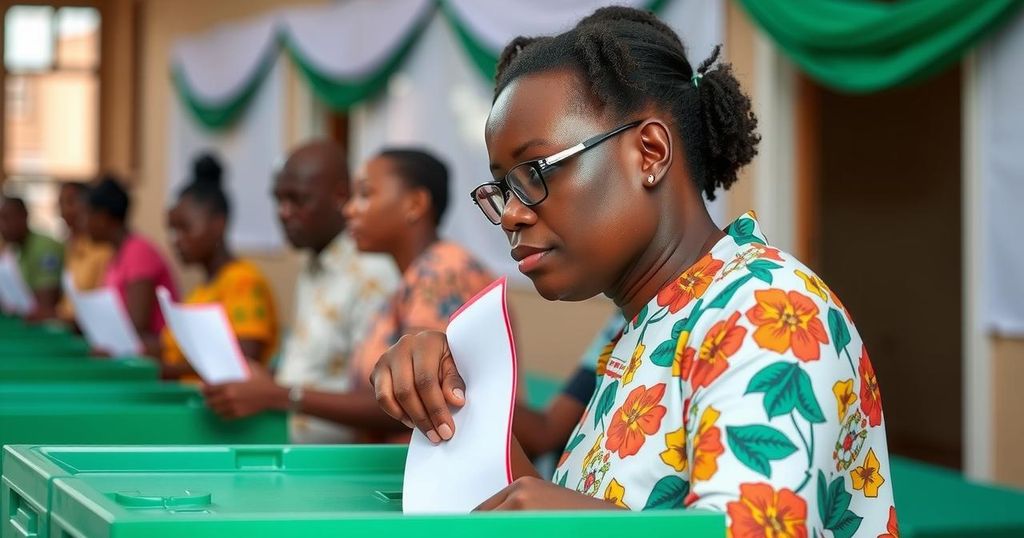Ghana’s Election: A Test of Democracy Amid Economic Crisis

Ghana’s recent elections highlight a nation in economic distress, with polls opening amidst severe inflation and high unemployment. The elections feature a tight race between Vice President Mahamudu Bawumia and former President John Dramani Mahama, both offering similar platforms in response to pressing economic challenges. Voter confidence is low, as the country grapples with illegal gold mining issues and a history of thriving democracy now overshadowed by an economic crisis.
On Saturday, polls opened in Ghana for presidential and legislative elections, a significant moment as the nation grapples with a severe economic crisis. Approximately 18.7 million citizens are registered to vote, yet prevailing circumstances cast a shadow over the election, with little faith in the candidates to effect meaningful change. Ghana has historically been a symbol of democratic stability within West Africa, but recent years have seen economic challenges like soaring inflation and rising unemployment stunt its progress.
This election features a competitive two-horse race between Vice President Mahamudu Bawumia of the ruling New Patriotic Party (NPP) and former President John Dramani Mahama of the opposition National Democratic Congress (NDC). Both candidates fail to present distinct plans, as many voters perceive minimal differences in their policies. The economic burden remains the focal point of the election, with both candidates attempting to appeal to voters through their final campaign messages in the lead-up to the vote.
Vice President Bawumia, an experienced economist, aims to build upon the initiatives of the current administration, while Mr. Mahama seeks to propose a comprehensive reset of the country across various sectors, including governance, economy, and infrastructure. As the election unfolds, the physical environment reflects a festive atmosphere, contrasted by an undercurrent of anxiety regarding the nation’s economic state.
Ghana’s economy has drastically declined, registering an inflation rate of 54% by the end of last year, significantly affecting the cost of living. The country has defaulted on foreign debts and combats pressing issues such as illegal gold mining, known locally as ‘galamsey,’ which has exacerbated environmental degradation and further degraded the economic conditions. As a result, while enthusiasm for the voting process is evident, the urgency of addressing the economic crisis weighs heavily on the minds of Ghanaians as they cast their ballots.
Ghana has been a beacon of democracy in West Africa, often regarded as a model for other nations in the region. Over recent decades, it has operated under a multiparty political system, providing regular electoral processes since 1992. However, the country currently finds itself in the midst of a severe economic crisis, with widespread challenges such as inflation and high unemployment rates that have significantly overshadowed the electoral process. Both the NPP and NDC have dominated the political landscape, yet the lack of substantive differentiation in their economic policies has led to voter disillusionment, prompting more than 80% of the population to express concerns about the nation’s direction. The emergence of illegal gold mining has also added to the electorate’s unease, resulting in protests and criticisms directed toward the ruling party’s governance.
In conclusion, the elections in Ghana represent a critical juncture for the nation as it battles an economic crisis while striving to uphold its democratic values. With voters confronted by a lack of confidence in the available candidates, the path forward appears fraught with challenges regardless of the outcome. As economic issues dominate the political discourse, the elected leaders will need to address the urgent needs of the populace to restore public trust and welfare.
Original Source: www.voanews.com







